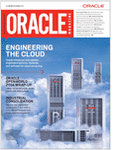7 reasons to go for Oracle Cloud ERP
Posted by Kashif Manzoor on 19th May 2015
In the beginning of 1990s new software systems were surfaced branded in the industry as Enterprise Resource Planning (ERP) systems for large complex organizations. These applications were proprietary systems and providing off-the-shelf solutions for organizations. However consultants/Vendors to tailor and implement them based on the company’s requirements. Sometime ERP Systems were pushing companies to re-engineer their business processes to accommodate the logic of the software modules for streamlining data flow throughout the organization. These ERP software solutions are integrated multi-module packages suitable for tailoring and adding “add-ons” as and when required with compare to traditional in-house-designed company specific systems.
These ERP Systems were on-premises model and then in early 2000 we have seen the influx of hosted solutions, in which the platform is managed off-site but the software must be installed on end-users computers. A third model have been hurled recently in which the ERP system is provisioned from the cloud and accessed by end-users via web browsers through internet.
To summarize the basic difference between on-premise ERP and cloud ERP is, On-premise ERP solutions are installed locally on your hardware/servers and managed by your IT Team while cloud ERP also called SaaS (Software-as-a-Service Applications) is provided as a Service. In this model, a company’s ERP software are managed centrally (in the Internet “Cloud”) by the ERP vendor like Oracle and are accessed by customers using a web browser through internet.
Oracle has launched Cloud ERP (SaaS Applications) which enable the companies to implement immediately and at a lower cost than with traditional on-premise implementations. Here I am covering Top 7 reasons to move to Oracle Cloud ERP
- Zero cost on hardware with Cloud ERP compare to traditional on-permise e-Business Suite Implementations. We were used to buy/invest on heavy Hardware to run Oracle EBS, in case of Cloud ERP we don’t require to buy hardware, it is responsibility of the vendor to ensure what we require to access, run our Cloud ERP.
- Zero cost on upgrades of Cloud ERP as this will be provided by Oracle free of charge to all customers and Oracle will ensure to keep upgrading to latest release of Cloud ERP Applications. In EBS we were upgrading Oracle ERP to any new release of packaged applications like from 11i to R12 and sometime this were being done by our internal IT teams or being contracted to outside vendor/consulting companies.
- Zero cost on Infrastructure Software like Operating Systems, Backup Solutions, and Disaster Recovery Sites. In Cloud ERP this will be no longer required and it will be responsibility of Cloud Vendor – Oracle
- No need of Oracle DBA/System Admins to maintain/work 24*7 to keep Live Oracle applications. In Oracle e-business applications, our internal DBAs were responsible to maintain Application and Database for Production, UAT, Test environment. In case of Cloud ERP, this will be reasonability of Cloud ERP vendor like Oracle
- Say No to customization on Cloud ERP, it will help business process harmonization for cloud deployment and eliminates major customization which ultimately make ongoing maintenance easy.
- Cloud ERP is bundled with BI compare to EBS. In Cloud ERP Financial Reporting and Analytics includes Fusion Financial Reports Center and Oracle Transactional Business Intelligence (OTBI) embedded analytics which provides role-based dashboards, and on-the- fly ad hoc reporting capabilities. In EBS were used to buy separate Oracle BI for analytics reporting.
- No need to invest in performance tuning, downtime schedules, security, Disaster recovery site and apply patches. All these lies with Cloud ERP vendor Oracle. We don’t need to be worry about.
Based on my assessment and market research, upfront cost benefits can be up to 40%, with no hardware, less implementation time, less maintenance cost and reduction in Support team.
Tags: Cloud ERP, Fusion Applications, SaaS
Posted in Cloud ERP | No Comments »





